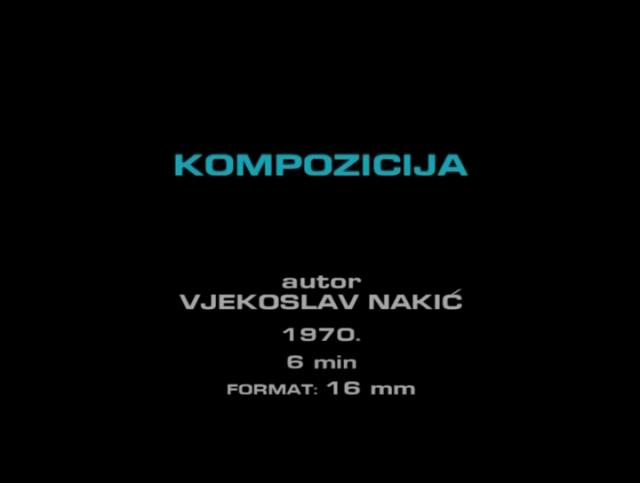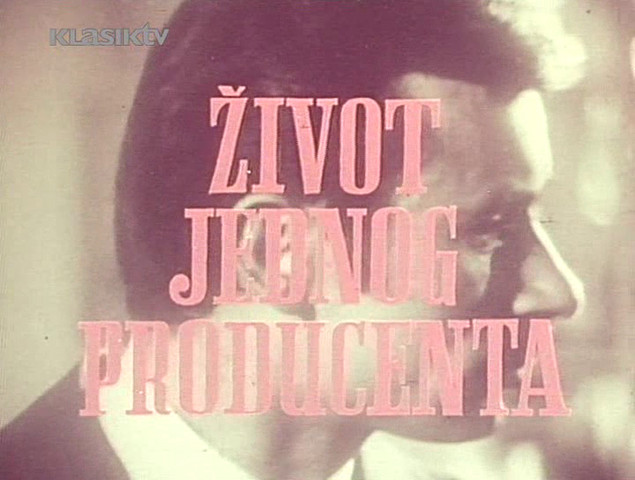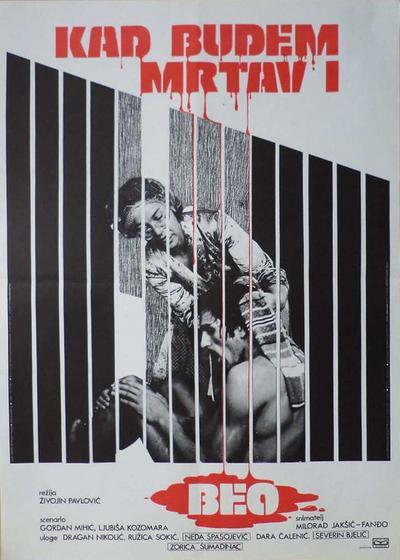An experimental film with no plot. Consists mostly of static shots portraying train wagons. The word COMPOSITION in Serbian has a triple meaning here – a train composition, composition of a shot, and music composition. Regarding the third meaning, the “soundtrack” of the film is a 5 second loop that keeps repeating itself over and over again.Read More »
Yugoslavian Cinema under Tito
-
Vjekoslav Nakic – Kompozicija (1970)
1961-1970ArthouseExperimentalVjekoslav NakicYugoslaviaYugoslavian Cinema under Tito -
Branko Bauer – Ne okreci se sine AKA Don’t Look Back, My Son (1956)
1951-1960Branko BauerDramaWarYugoslaviaYugoslavian Cinema under TitoPlot:
A partisan comes secretly to town to find about what happened to his little son who barely remembers him. He is horrified when he finds out that his son is raised in a colaborators’ orphanage, brought up to hate and fight communists and partisans. He decides to take his son to the freed territory out of town…
Read More » -
Mila Turajlic – Cinema Komunisto (2010)
2001-2010DocumentaryMila TurajlicPoliticsSerbiaYugoslavian Cinema under TitoQuote:
When history has a different script from the one in your films, who wouldn’t invent a country to fool themselves? The collapsing sets of Tito’s Hollywood of the East take us on a journey through the rise and fall of the illusion called Yugoslavia. Exploring the ruins of the forgotten film sets and talking to directors, producers, policemen and Tito’s projectionist about the state run film studios and Tito’s personal love for cinema and it’s stars, ‘Cinema Komunisto’ uses film clips to go back to the film when ‘His story’ became the official history.Read More » -
Stole Popov – Avstralija, Avstralija AKA Australia, Australia (1976)
1971-1980DocumentaryMacedoniaStole PopovYugoslavian Cinema under TitoMovie from 1976, in duration of 82 minutes.
The movie is created in widescreen technique, with sound, in color and 35mm.
Production:
Vardar film – Skopje
Content:
The film reflects the life of the Macedonian emigrants and migrant workers in Australia. With their going away in far away countries and living abroad, some of them have succeed in socializing, but there are still some of them who always remain with the dilemma of returning in their native country. Through their personal retellings and the metaphor description of their whole way of living in the new surroundings, expressed in a mosaical cinemathographic way, one could get known with the hard work of the Macedonian emigrants; also, the education of their children, as well as the holly celebrations in the church, such as the baptizing, the weddings, but even the funerals either, as unavoidable part of human living.Read More » -
Dusan Makavejev – Nevinost bez zastite aka Innocence Unprotected (1968)
1961-1970ArthouseDusan MakavejevYugoslaviaYugoslavian Cinema under TitoQuote:
Innocence Unprotected was originally filmed in 1941 under the title Nevinoz bez Zastite; it was meant to be the first all-talking feature ever made in Serbia. Yugoslav gymnast Dragolijub Aleksic wrote, produced, directed and starred in this simple tale of a young man who rescues his lady love from her wicked stepmother. The film was never released, falling victim to the Nazi censors; later on, the film was condemned as pro-Nazi (huh?) Flash-forward to 1968: documentary filmmaker Dusan Makavejev unearthed this forgotten film, expanded upon it with newsreel footage of Dragolijub Aleksic performing his athletic feats and filmed interviews with the surviving cast members, and came up with Innocence Unprotected. The result is less a dramatic film than a montage-like celebration of Yugoslavian customs, folklore, and humor. Makavejev referred to Innocence Unprotected as a “montage of attractions”; viewers will no doubt find those attractions most attractive.Read More » -
Mladomir ‘Purisa’ Djordjevic – Kisa, ili Zivot jednog producenta AKA Rain, or The Life of a Producer (1972)
Drama1971-1980ArthouseMladomir 'Purisa' DjordjevicYugoslaviaYugoslavian Cinema under TitoQuote:
A short love affair of young married woman and police inspector in winter resort will turn into fatal love after chance meeting. Inspired by Chekhov’s story “The Lady with the Dog”.Read More » -
Milos ‘Misa’ Radivojevic – Bube u glavi aka This Crazy World of Ours (1970)
1961-1970ArthouseDramaMilos 'Misa' RadivojevicYugoslaviaYugoslavian Cinema under TitoQuote:
Two emotionally distraught lovers find life is too much for them and enter an insane asylum. He is beaten and watches as she is raped. An attending physician fondles and kisses her during an examination in front of an X ray machine. The poor girl is driven to suicide, and the man learns too late of the psychological and physical assaults that led to her death in this tragic drama. This feature was invited to appear at the Venice Film Festival in 1970.Read More » -
Zivojin Pavlovic – Kad budem mrtav i beo AKA When I Am Dead and Gone (1967)
1961-1970ArthouseDramaYugoslaviaYugoslavian Cinema under TitoZivojin PavlovicPlot:
Janko Bugarski “Džimi Barka” is a small time wallet snatcher, and an aspiring singer, who wants to make it big with as little effort as he can, traveling through industrial areas and looking for affairs with local women and easy money. On one of his travels he meets a young girl he takes to Belgrade to accompany him on an amateur singing contest, where he fails miserably, since he can’t follow a tune, and abandoning her, teams up with his former girlfriend, also a pickpocket, which takes him to his final journey.Read More » -
Dusan Makavejev – Ljubavni slucaj ili tragedija sluzbenice P.T.T. AKA Love Affair, or the Case of the Missing Switchboard Operator (1967)
1961-1970ArthouseDramaDusan MakavejevYugoslaviaYugoslavian Cinema under TitoAn early (1967) film by Dusan Makavejev, the master of the eastern European dirty joke (WR: Mysteries of the Organism, Montenegro). The passionate affair of a telephone operator and a Marxist rodent exterminator is intercut with lectures on criminology and sexology, with occasional cooking lessons. It’s very funny and, with its ragged arrangement of warring styles and ideologies, very original: it’s like a smutty, sticky-fingered Godard. – Dave Kehr, The Chicago ReaderRead More »









